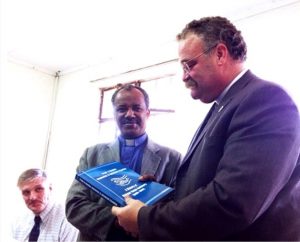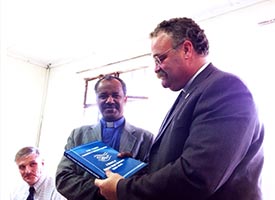By Adriane Heins
When the 6.35 million-member Ethiopian Evangelical Church Mekane Yesus (EECMY) broke fellowship with the Evangelical Lutheran Church in America (ELCA) in February 2013, the Rev. Dr. Albert B. Collver III, LCMS director of Church Relations and Regional Operations, noted that “world Lutheranism, particularly in Africa, is undergoing a realignment.”

Less than a year later, that realignment has moved the EECMY and the LCMS even closer, as representatives met in Addis Ababa, Ethiopia, Jan. 23-26 to discuss entering purposeful discussions about the relationship between the two churches.
“I never thought the day the EECMY and the LCMS would begin formal discussions would come so quickly,” Collver said. “The EECMY professes commitment to the Holy Scriptures and sees the LCMS as a natural partner. The willingness to discuss doctrine in a serious way and to re-examine positions and practices is truly a gift from God.”
The EECMY ended formal fellowship with the ELCA last spring due largely to the latter’s allowance of gay and lesbian clergy. The EECMY initially sent an official letter to then-Presiding Bishop Mark Hanson of the ELCA, urging the church to return to the “eternal holy and inspired Word of God” with regard to human sexuality, noting that, “The fundamental position of the EECMY on any ethical issue including homosexual practice rests on her belief in the eternal truth of teaching of the Holy Scripture and not on human decision.” When the EECMY failed to receive a response from the ELCA, the church’s General Assembly voted to end fellowship.
Since then, representatives from the EECMY and LCMS have discovered that “both church bodies believe that the Holy Scriptures are the Word of God and the only source and infallible norm of all church doctrine and practice,” a Jan. 27 joint EECMY-LCMS press release noted. “Both churches also subscribe to the Lutheran Confessions.”
But while theological differences occur and must be discussed, representatives for the two churches “believe that the common confession they share about the Holy Scriptures and acceptance of the ecumenical creeds, the unaltered Augsburg Confession, and the Small and Large Catechisms justifies, even demands, that the two churches engage in more formal discussion regarding areas of agreement and disagreement.”
The initial meetings in Ethiopia included the Rev. Dr. Wakseyoum Idosa, president of the EECMY; the Rev. Dr. Berhanu Ofgaa, EECMY general secretary; the Rev. Dr. Matthew C. Harrison, president of the LCMS; Collver; and LCMS missionaries Rev. Dr. Carl Rockrohr, dean of the School of Theology at Mekane Yesus Seminary, and Deaconess Dr. Deborah Rockrohr.
During those meetings, “President Harrison commended the Mekane Yesus church for desiring to remain faithful to the Holy Scriptures and for taking difficult stands on biblical teaching that were unpopular with her partners,” noted Collver.
“While holding his Bible in hand, President Wakseyoum stated the EECMY’s and the LCMS’ commitment to the Holy Scriptures was the primary reason that the two churches should be talking to one another.”
Those future discussions will include, according to the release, “a three-member team from each church body, along with the church bodies’ respective presidents” and will begin within the next nine months.
The faithful witness of the EECMY and LCMS and their future deliberations are clearly a source of joy for both church-body presidents. Wakseyoum believes that, “through the guidance of the Holy Spirit and the study of the Holy Scriptures, both church bodies would come closer to each other.” Harrison noted that, “Contact between our church bodies began almost a decade ago. We have been tremendously encouraged by Mekane Yesus’ public confession of the Holy Scriptures regarding issues of sexuality. Their zeal in outreach is something the Missouri Synod can learn from. I am glad that we have come by God’s grace to this moment of serious dialogue.”
Ultimately, “Although we do not know what the outcome of these talks will be,” Collver said, “we give thanks to God for the willingness to discuss and pray for the Holy Spirit’s guidance as the discussions begin.”
Adriane Heins is executive editor of The Lutheran Witness.
Updated Jan. 28, 2014 / Jan. 30, 2014
